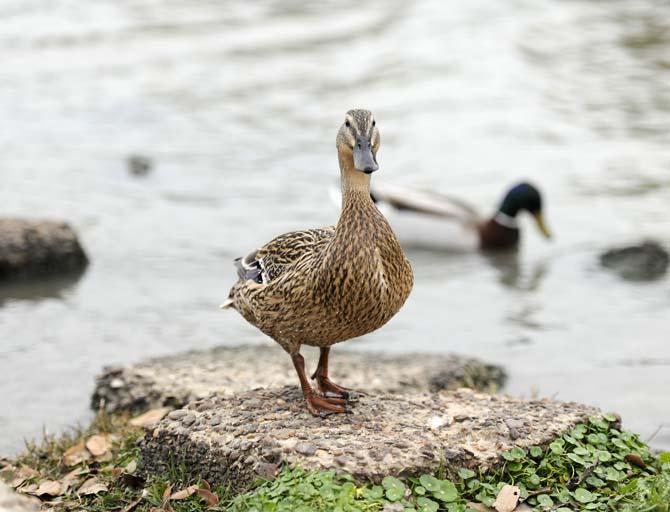Ducks Unlimited, a nonprofit hunting and conservation group, recently awarded University professor Alan Afton with the 2014 Wetland Conservation Achievement Award.
Afton was recognized for the many scientific contributions he has made to wildlife conservation over the course of his 45-year career.
Afton is a wildlife biologist who studies the social and migratory behaviors of waterfowl and the effects of human activity on their populations.
His current projects include research on the ecology and management of geese, Louisiana bald eagles and lesser scaup, a duck species whose numbers have been in decline since the 1980s.
Afton said populations decline for two reasons: organisms either have trouble surviving or reproducing.
The enigma of the lesser scaup’s dwindling numbers has yet to be fully resolved, but Afton’s extensive research indicates that their ability to reproduce is diminishing.
Afton attributed much of this decline to the destruction of historic Scaup habitats by large agricultural corporations. Scaup typically nest in wetland depressions, and the drainage of wetlands leaves them unable to nest in conditions that allow their offspring to hatch.
“Mature ducks are able to survive, but fewer offspring successfully hatch,” Afton said.
Afton also said climate change and run-off from agricultural production that flows into wetlands is likely partially responsible for the decline in the reproductive success of waterfowls.
This run-off carries chemicals and nutrients from farming practices into lakes and ponds and creates dead zones that endanger the ducks’ reproduction. Dead zones are areas in oceans and large lakes that lack oxygen levels needed to support marine life at the bottom of water.
These bodies of water lack oxygen because plankton feed on the influx of nutrients and reproduce rapidly, consuming all the oxygen present near the top of the water.
“It’s a very real and dangerous problem,” Afton said.
Efforts to preserve duck habitats have been met with some success. Government regulations, like the Wetlands Protection Act, give farmers money to dissuade them from draining wetlands the ducks need to reproduce.
Afton’s own research has been used in efforts to counter the damage already done to the habitats, and to manage the habitats and populations of birds that live in them. Afton said that groups like Ducks Unlimited, which hunt birds, are integral to efforts to combat habitat destruction.
“Hunters don’t want to destroy the environment, they want to keep most of the birds alive, so they donate the most to conservation groups,” Afton said.
Hunting does not significantly affect duck population numbers, he said. If it did, the birds would have trouble surviving instead of reproducing.
Afton said a percentage of the cost of hunting licenses and tests is given to conservation groups dedicated to the preservation of bird habitats.
“Without hunters, conservation would be a lot harder, so it’s an honor to receive this award,” Afton said.
“Hunters don’t want to destroy the environment – they want to keep most of the birds alive, so they donate the most to conservation groups.”
Professor honored for wetland conservation efforts
By Panya Kroun
March 26, 2014
An inquisitive female mallard takes a break from swimming Wednesday, March 26, 2014, at University Lake.





